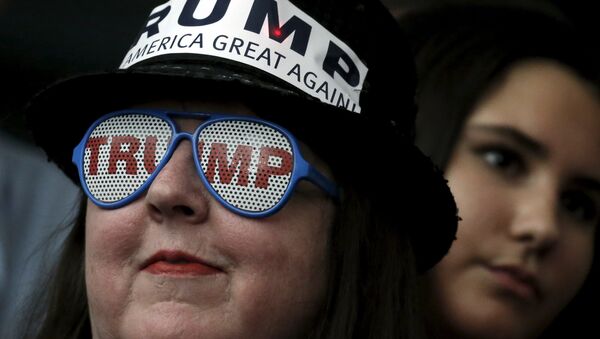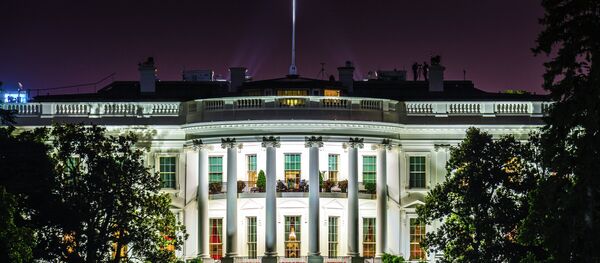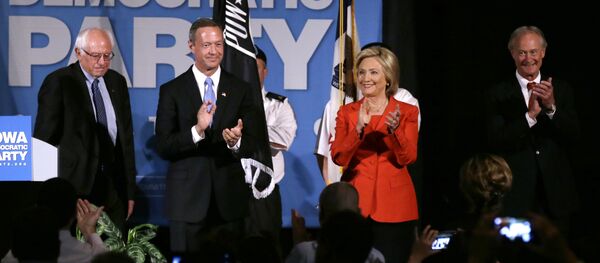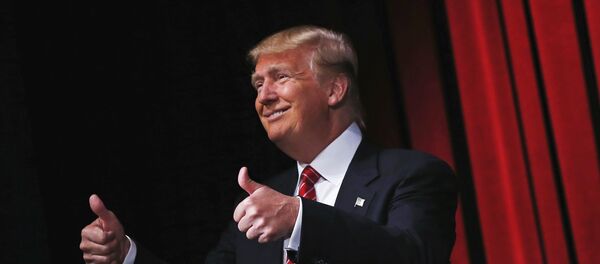WASHINGTON (Sputnik) — The two party outsiders are now favourites to win the respective Republican and Democratic Party primary elections, according to the most recent opinions polls before the vote in small northeastern state today.
New Hampshire is the first primary election and only the second real test of voters’ opinions in the four-month-long, state-by-state contests to determine whom Republican and Democratic voters want as their parties’ presidential nominees.
The candidates who win the largest number of delegates in the primaries are usually accepted as the parties’ presidential nominees the their respective national conventions.
This year, the Democrats will hold their national convention in Philadelphia, Pennsylvania from July 25 to July 28, and the Republicans in Cleveland, Ohio from July 18 to July 21.
Trump, Sanders Show Renewed Strength in New Hampshire Primaries
On Monday, Sanders hit back hard at negative attacks from Clinton, who sought to reduce his increasing lead. He dismissed the attacks as false.
"It is very disturbing that, as the Clinton campaign struggles through Iowa and New Hampshire, they have become increasingly negative and dishonest," Sanders said in a press release.
As Clinton’s support ebbed in New Hampshire, polls showed younger American women Democrats abandoning her to support Sanders.
This angered 78-year-old former Secretary of State Madeleine Albright, a staunch Clinton supporter and veteran Democrat, said at a rally in New Hampshire introducing Clinton on Saturday, "There’s a special place in Hell for women who don’t help each other!"
Albright’s remarks drew widespread criticism as being needlessly abusive and threatening toward young women who did not choose to support Clinton.
The same Real Clear Politics composite showed Donald Trump holding another strong lead over a more fragmented Republican field with 30.7 percent of the potential vote. His nearest challenger, US Senator Marco Rubio from Florida, had less than half that, or 14.8 percent.
In a surprise third place was current Ohio state governor John Kasich with 13 percent of the vote and last week’s victor the Iowa caucuses, US Senator Ted Cruz from Texas, who slumped badly back to fourth place with only 12.7 percent.
Former Florida Governor Jeb Bush, the son and brother of former presidents and once the favourite of the Republican establishment, remained in dire straits with only 10.5 percent of the vote, keeping him in fourth place, according to Real Clear Politics.
Three other candidates trialled the field and may have to pull out of the race entirely if the vote on Tuesday confirms their potentially poor showing in the opinion polls.
Current New Jersey Governor Chris Christie received only 5.3 percent in the Real Clear Politics composite despite a strong showing against Rubio in the Republican candidates’ debate on Saturday night.
The only woman in the Republican field, former Hewlett Packard CEO Carly Fiorina could manage 4.3 percent and retired neurosurgeon Ben Carson, who briefly led the entire Republican race, received only 2.8 percent.
Senators Sanders, Ted Cruz Staged Surprise Gains in Iowa Caucuses
Trump later claimed Cruz had cheated in Iowa by allegedly having his campaign spread false rumours that retired neurosurgeon Ben Carson was about to drop out of the race.
"Ted Cruz didn't win Iowa, he stole it. That is why all of the polls were so wrong and why he got far more votes than anticipated. Bad!" Trump said in a Twitter message on Wednesday, February 3, two days after the Iowa caucuses.
During Saturday’s presidential debate, Cruz apologized to Carson for misleading for telling voters Sanders was dropping out of the race.
In the Iowa caucuses, Clinton very narrowly edged out Sanders by 49.84 percent of the vote to 49.59 percent. Statistically, it was a virtual tie and an extraordinarily impressive result for Sanders who was 45 points behind Clinton in early May 2015.
Some Sanders supporters believe that he actually won and they claimed foul play in falsifying the results from around 90 disputed caucus sites. Two videos emerged of actual voter fraud. The sense of foul play was aggravated by the fact Clinton won six time by flipping a coin in precincts where the vote was literally tied.
Mainstream candidate Senator Marco Rubio came in third in Iowa with 23.1 percent, only slightly behind Trump. But he was widely regarded as having performed poorly in a nationally televised debate of the remaining leading Republican candidates on Saturday night.
The Iowa caucuses were tiny in number compared to later primaries and the estimated 130 million people who may vote in the November presidential election, but they forced several candidates to end their hopes of winning the presidency.
On the Democratic side, former Maryland Governor Martin O’Malley pulled out of the race after failing to win even 1 percent of the votes in Iowa.
Among Republicans, Senator Rand Paul, the only Republican candidate to oppose unlimited electronic surveillance of all citizens by the National Security Agency and other US government intelligence organizations, failed to attract any significant support and pulled out after winning only 4.5 percent in Iowa.
"It's been an incredible honor to run a principled campaign for the White House," Paul, a libertarian, stated. "Today, I will end where I began, ready and willing to fight for the cause of Liberty."
Former Arkansas Governor Mike Huckabee, who won Iowa in 2008, pulled out after the results were announced there too. On February 1, less than an hour after the caucus results were announced he withdrew from the race after winning only 1.8 percent of the caucuses vote.
"I am officially suspending my campaign. Thank you for all your loyal support," Huckabee said in a terse Twitter message.
Caucuses Differ From Primaries
Caucuses are different from primary elections. They involve usually far fewer individuals and are held at several hundred locations in some individual US states instead of primaries. They are usually only open for 90 minutes or up to two hours.
Caucus participants can make speeches on behalf of their favoured candidates and work to persuade other participants to abandon their first choices and switch their support.
For these reasons, caucuses reflect a much smaller and more unpredictable cross-section of public opinion than primary elections do.
Complicating Factor: Every State Has Different Primary Rules
The turnout of voters in primary elections to pick presidential candidates and also the parties’ choice as candidates to run for both chambers of Congress, the House of Representatives and the Senate, is much smaller usually than in the main elections to choose the next president.
Every seat in the House of Representatives and one-third of the Senate will be contested in the national elections, which are always held on the first Tuesday of November every four years.
In the so-called mid-term elections, all of the House seats and one-third of the Senate are chosen two years into a four-year presidential term.
In most states, one must be a registered member of the Democratic or Republican Party to vote in a primary. But in some states the rules are different and independent voters who are not affiliated with either party can vote in primaries too.
Therefore hopeful candidates tend to vary their strategies from state to state, depending on whether they want to attract hard-core party activists or more moderate, centrist independents.
The voting in different US states also reflects the different political, racial, economic and cultural composition of the populations there.
Primary Races May Be Decided in Major Industrial US States
New Hampshire is a small state with a population of 1.3 million, but it is typical of industrial states across the Northeast and the Midwest of the United States in what is often called the Foundry region.
These areas prospered from the 1840s to the 1960s as major industrial centers, but then lost most of their manufacturing centers and sources of urban jobs to rising industrial nations on the Pacific Rim.
Trump and Sanders are both expected to do better in these states in attracting protest voters, especially from white working class and middle class communities who have been hit hard by the long-term economic decline of traditional industries across the United States.
Trump and Sanders have worked especially hard to woo voters in New Hampshire. Trump has promised to build a new hospital for the state’s military veterans if he becomes president, and his message of reviving Us industry goes down very well in a state where old industries have collapsed.
Sanders represents the tiny neighbouring state of Vermont in the US Senate, and he has a long record of championing the interests of New Hampshire too. Even if either or both of them do well in the New Hampshire primary, as they are expected to do, they may not enjoy such favourable conditions in other contests across the United States.
One of the most important of the later primaries will be in Michigan on March 8. Michigan is a major industrial state with a population of just under 10 million and is seen as typical of trends in the Midwest and industrial US states.
If either political party contest is not quickly or easily resolved, the last major primary on June 7 in the most populous state of the United States, California, could prove decisive.






